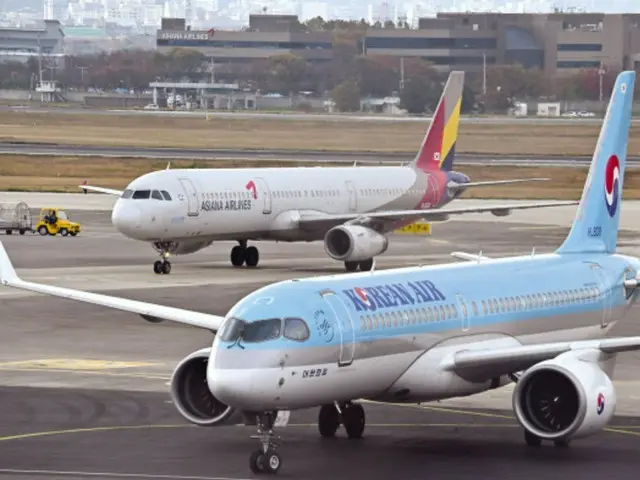The competition authorities of Japan have been conducting an examination to determine whether there are any competition problems. With Japan's approval, only the United States and the European Union (EU) remain. Reuters reported last month, based on interviews with multiple sources,
It is reported that the European Commission (EC) is expected to approve the merger. Given this, some South Korean media are reporting that the only thing that remains is US approval.
There is a long history behind the merger of the two companies. Asiana Airlines had a debt of 8.4 trillion won in the fiscal year ended December 2015 (approximately 92
4,488 million yen), and business conditions deteriorated. Although the company sold its headquarters building in 2018, it began to struggle with cash flow, and South Korean conglomerate Kumho Asiana Group closed its doors in April 2019.
announced the sale of Seana Airlines. At the end of 2019, a consortium of Hyundai conglomerate group HDC Hyundai Industrial Development and Mirae Asset Daewoo announced the acquisition of Asiana Airlines, but the new
Due to the spread of the coronavirus, the situation has changed significantly from when the acquisition agreement was signed, and in September 2020, HDC announced a clean sheet of its plan to acquire Asiana Airlines. In response to this, Asiana Airlines' debt
The government-affiliated Korea Industrial Bank, which oversees Kwondan, decided to sell it to Korean Air. Korean Air officially announced the acquisition of Asiana Airlines in November 2020. Korean Air and Asiana Airlines
Rather than operating as an independent company, integration is expected to generate synergies and maintain employment, as well as improve the efficiency of overlapping routes, increase the number of new destinations, diversify flight schedules, and increase customer service.
He emphasized that there are benefits such as increased choice for customers, the ability to earn miles, and diversification of usage methods. After the merger is completed, the Asiana brand will be discontinued and the Korean Air brand “Korean” will be replaced.
The company plans to streamline its fleet and sales organization by consolidating its operations into ``Air''. Starting from January 2021, Korean Air will have to compete with 14 countries for business combination approval.
filed a declaration with the dispute authority for approval. It was subsequently approved by authorities in South Korea, Turkey, Taiwan, Vietnam, Singapore, Malaysia, Australia, and China. Conditionally approved
Screening has been completed in 11 countries and regions, including the United Kingdom, which has notified Korean Air that it will be excluded from the preliminary screening, and the Philippines, which has terminated the procedure because it is not subject to screening.
. Japan's Fair Trade Commission announced on the 31st of last month that it had approved the acquisition plan. Until now, on the Japanese side, Korean Air has been involved in not only Asiana Airlines but also LCCs (low-cost carriers) belonging to the Korean Air Group.
If Jin Air (an airline company) and Asiana Airlines' LCCs Air Busan and Air Seoul were to become subsidiaries, Korean Air would increase its share on routes between Japan and South Korea, potentially limiting competition.
and requested corrective measures. In response to this, Korean Air has announced that it will operate seven routes: Sapporo/Chitose, Nagoya/Chubu, Osaka/Kansai, Fukuoka-Seoul/Incheon, and Sapporo/Chitose, Osaka/Kansai, and Fukuoka-Busan.
The proposal is to correct the oligopolization of market share by transferring departure and arrival slots. The JFTC determined that, assuming these measures are implemented, there is no risk that competition will be hindered.
With Japan's approval, only the US and EU remain. Korean Air said, ``Japan's approval will have a positive impact on US and EU approval decisions.
I look forward to that," he commented. Regarding the merger of the two companies, in May last year, the EC, the EU's administrative enforcement agency, announced the results of the interim review of the business integration review of both companies and objected to the merger.
Ta. EC has expanded its passenger transport business to cargo operations on four routes: Incheon - Frankfurt (Germany), Paris (France), Barcelona (Spain), and Rome (Italy).
Regarding this, he expressed the view that there are concerns about restrictions on competition between South Korea and the whole of Europe. In response to this, Korean Air submitted a proposal for corrective measures to the EC in November last year to alleviate concerns about competition restrictions. Currently under review
However, according to Korean media and other sources, the EC is scheduled to announce the results before the 14th of this month. Reuters also reported last month that the EC is expected to approve it.
If the EU approves it for the first time, only the US will remain, but South Korean media Asia Today said, ``It is up to the industry to decide whether the US will approve or not.
There are mixed views," he said. The article states, ``If Europe is willing to approve the route, it is expected that the United States will follow suit, and there is also a prediction that the U.S. Department of Justice may file a lawsuit due to concerns about the monopolization of the U.S.-Korea route.''
``If the U.S. backlash becomes a reality, it will be another mountain.''
2024/02/05 08:59 KST
Copyrights(C)wowkorea.jp 5

